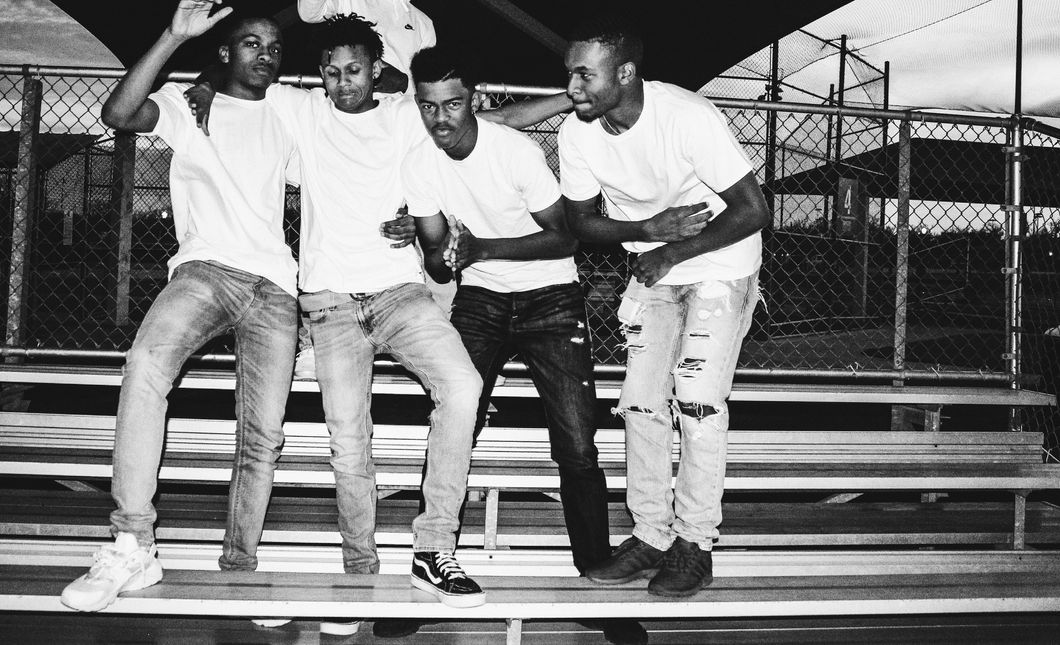Disclaimer: I am not a licensed therapist or psychiatrist. Below is a list of helplines and chat lines. If you're a college student, look into your campus resources for help from licensed and trained medical professionals because you may be entitled to free or discounted healthcare. Know your options.
National Suicide Prevention Lifeline: 1-800-273-8255
National Association of Anorexia Nervosa and Associated Disorders: 1-630-577-1330
National Eating Disorders Association Helpline: 1-800-931-2237
Crisis Textline: Text CONNECT to 741741
National Domestic Violence Hotline: 1-800-799-SAFE (7233) or 866-331-9474
National Sexual Assault Helpline: 800-656-HOPE
There's a double standard in the discussion on mental health. The dialogue has been opened up in my generation about mental health that we know is true, but there seems to be a lack of coverage on how this discussion translates when it's directly focused on men. Let's state the facts, men are 3.54 times more likely to commit suicide than women (https://afsp.org/about-suicide/suicide-statistics/) and that's not to say that we stop focusing attention on women's mental health, but digger deeper into why the rate is higher for men. There's a discussion that needs to be had and it's about how men feel. It's about the male counterpart as an emotional being with the capacity to not always feel okay.
Men are seen as a security blankets, protecters, warriors, heads of the household and in a growing world of femininity being translated into being seen as these things as well there's been a lack of translation for how men divulge into the past deemed "feminine" qualities. In society, are we ready to view men as beings who are privy to emotional states of distress, heartbrokenness, self-esteem issues, eating disorders, bipolar disorder, body dysmorphia? It's been socially engrained in our heads what a man is supposed to be like and it's up to us to challenge these preconceived notions. I spoke with Francis 'Trey' Lawerence, a student at Texas Tech University, who elaborated that "this perception that the perfect man is the strong silent type has been engraved into male culture for centuries so although recent strides are huge, that stigma which makes it hard for men to be open and receive help won't be washed away easily."
A lot of this stems from representation. How have we presented men's mental health via the media? Often it's only ever discussed when a male mass murder's actions need to be justified and that's not what I want to attribute to male mental health because not everyone who has a mental illness acts like that. I'm not saying romanticize male mental illness in a movie, but have accurate relatable depictions of something men can gravitate to. Danny Wolstanholme, the blog creator of MENtal Health (linked below), shared with me that "More and more people talking about it. On the television, through advertisements for example. Seeing them in places you wouldn't expect, posters in men's toilets/restrooms, promotions at sports games, positive celebrity endorsements maybe. Make it so normal that people will want to talk, rather than bottle everything inside."
https://mentalhealthbtst.blogspot.com
Normalizing men's mental health helps provides normalcy for men to seek help. Men should be able to feel validated with their emotions from their partners, friends, siblings, parents, teammates, and therapists. Men should have a safe space to talk about the things they've been through. There are men who have never met their father, lost their mother, were deeply hurt by someone they loved, who don't like what they see in the mirror and they should be allowed to communicate if those things are taking a toll on them. More importantly, they should be allowed to communicate these things and not feel as if they are less of a man in anyone's eyes.
As a black woman, I am fiercely protective over the black experience and it wouldn't be right if I didn't specifically highlight black men in this article. I hate this negative stereotype that black men can't be empathetic sensitive sensual creatures who can express themselves because I've been fortunate enough to meet black men who have bore their souls to me. A black man expressing himself is one of the most beautiful things I have ever witnessed. It's captivating and as a black woman who may one day raise a black man myself, I find it important to let it be known that black men are emotionally competent people. I've seen it and I believe in it.
I leave you with a quote from Joshua Anderson
"This vessel has not come to a stop, but has found something new to live for; to show people my power to overcome. My story is not over yet."













